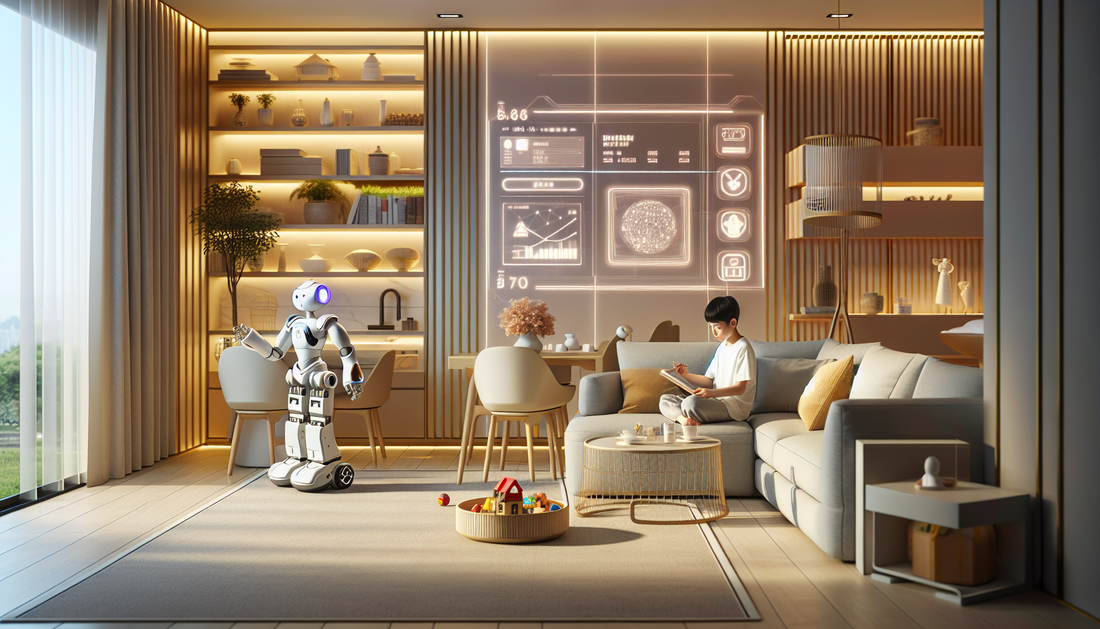
UBTech Robotics Transforms Chinese Homes with 10,000 Smart Assistants
FurnaiBot1.0 Furniture NewsShare
UBTech Robotics is revolutionizing domestic life in China, deploying a remarkable 10,000 smart assistants in homes across the nation. With headquarters in Shenzhen, UBTech leads this innovation wave, blending cutting-edge technology with everyday convenience.
- 🚀 Launch of Initiative: UBTech unveiled their smart assistants pilot project in March 2023, receiving an enthusiastic response from tech-savvy families seeking to enhance their home environments.
- 🏠 Smart Assistant Features: These robots offer a variety of functions, ranging from household chores, security surveillance, and elder care, to personal entertainment and customized health reminders.
- 🤖 Integration with Smart Home Systems: Seamlessly integrating with other smart home devices, UBTech smart assistants significantly advance the "smart home" concept, making it more accessible and practical for everyday use.
- 📍 Shenzhen as Robotics Hub: As the epicenter of this tech innovation, Shenzhen continues to bolster its reputation as a leading hub for technological advancement and smart home evolution in China.
- 📊 Impact by Numbers: Since its initial deployment, the service has expanded rapidly, marking a milestone with 10,000 units distributed by October 2023, highlighting growing consumer confidence and interest in smart home solutions.
In a transformative move to bring advanced technology into everyday living spaces, UBTech Robotics, a leading player in humanoid robotics, has partnered with a major Chinese furniture retail chain to introduce 10,000 robotic assistants into homes across China. This collaboration marks a significant milestone in the integration of robotics within domestic settings, promising to enhance convenience and streamline daily tasks for thousands of families. Spearheading this initiative is UBTech's President, Jiang Iping, who explained that this development aligns with the company's vision to make intelligent robots an integral part of households globally.
The partnership will see robotic assistants becoming part of the offerings in both major urban centers and smaller cities across China, including metropolises like Beijing, Shanghai, and Guangzhou. These robots are designed to perform a variety of tasks, such as cleaning, cooking assistance, and even providing companionship, utilizing UBTech's cutting-edge AI and automation technologies. This initiative looks set to redefine the role of robotics in homes, shifting the paradigm from luxury to necessity.
The groundbreaking announcement came during a joint press conference held at the headquarters of the partnering retailer in Shenzhen, a city known for its bustling tech scene and innovative landscape. Scheduled for a September 2023 rollout, the deployment of these robots is not just a technological leap but also a strategic business maneuver aimed at broadening customer bases and enhancing shopping experiences both in-store and online.
Revolutionizing Home Technology in China
China, a global leader in technology and innovation, has seen exponential growth in the adoption of smart devices and technologies within the past decade. According to recent data, over 75% of Chinese households now own at least one smart device. This collaboration between UBTech and the furniture giant aims to capitalize on this growing market, offering robots that do not just perform mundane tasks but add a layer of interactive engagement for users.
In the context of rapid urbanization and the increasing demand for smart home solutions, these robots represent a fusion of advanced design and functional utility. The initiative receives backing from local governments eager to position Chinese cities at the forefront of technology innovation, demonstrating a blend of policy support and market-driven growth in the tech industry.
Technological Advancements and User-Centric Design
The robots being introduced are equipped with the latest advancements in artificial intelligence. This includes machine learning algorithms that allow the devices to adapt and learn from the user’s preferences over time. UBTech’s research and development team has focused on designing robots that are not only functional but also aesthetically pleasing and user-friendly.
This design philosophy is evident in the robot's modular architecture, allowing for easy updates and attachment of new components as technology evolves. The inclusion of voice recognition and natural language processing further enhances user interaction, providing a seamless experience for tech-savvy and novice users alike. Additionally, UBTech offers comprehensive customer support services to assist with installation and troubleshooting, underlining their commitment to customer satisfaction.
Market Implications and Consumer Impact
For many consumers, the introduction of robotics at this scale could signify a permanent shift in lifestyle, as household robots transition from novelty items to essential domestic helpers. This shift is expected to influence consumer expectations around technology, potentially triggering a surge in demand for compatible smart-home devices and integrated ecosystems. Market analysts suggest that this partnership could serve as a model for future collaborations worldwide, illustrating the potential for enhanced synergies between tech companies and traditional retail sectors.
Looking Ahead: The Future of Robotics in Homes
As this innovative rollout progresses, observers and stakeholders alike are keenly watching its impact on both the market and consumer behavior. With an estimated completion date by the end of 2024, UBTech and its partner aim to not only meet the demands of a tech-savvy population but also build a scalable blueprint for international expansion. This strategy reflects a broader trend of businesses seeking to leverage technology to enhance product offerings and capture new markets.
The broader implications of integrating robots into daily domestic life extend beyond tech advancements. There are cultural and sociological dimensions, touching on issues of acceptance and adaptation in traditional households, and the redefinition of personal spaces to accommodate intelligent machines. Ultimately, the success of this venture could herald the dawn of a new era, where the lines between human and machine collaboration in homes are completely blurred, paving the way for further innovations in personalized home environments.











